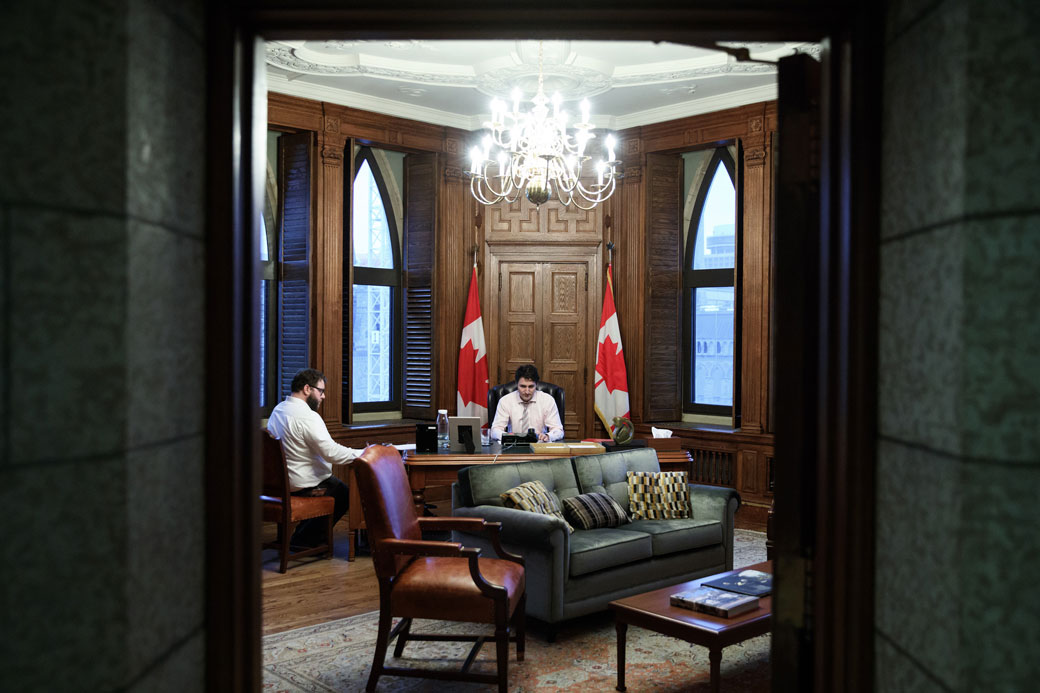The prime minister’s personal staffers have a partisan mission. Each political cycle ends with an election: the Prime Minister’s Office (PMO) is supposed to make sure the government comes out on top.
While Prime Minister Trudeau enjoys personal popularity, his government is exhibiting signs of political amnesia. They keep forgetting why they were elected.
With 18 months in office, on key files the Liberals seem incapable of distinguishing themselves from the previous Harper Conservatives.
It may be reassuring for Justin Trudeau to have his campaign team making policy, but it is not working out well with Chief of Staff Katie Telford and Policy Advisor G.M. (Gerry) Butts running things from the PMO.
How could the Trudeau government introduce a 300-page so-called budget implementation bill, after promising that such Harper-style omnibus legislation would disappear under the Liberals?
It is hardly going to escape parliamentary attention that the omnibus budget bill is a crude attempt by the Liberals to pass legislation without it receiving adequate examination.
The PMO has adopted Harper-like tactics because the opposition have succeeded in shutting down Liberal efforts to move bills through Parliament.
A report by Rachel Aiello in The Hill Times gives details on how Liberals efforts to amend the Standing Rules of Procedure in the House of Commons have evoked opposition ire and led to a freeze on parliamentary business.
The opposition point of view received sympathetic understanding from long-serving Liberal MP Wayne Easter.
When questioned by Rachel Aiello about the Liberal approach to Parliament, the Member from Malpeque, P.E.I., stated:
“This is the House of Commons. It’s not the House of Cabinet. It’s not the House of the PMO. It’s the House of Commons. It’s the people’s House, and the majority of the people in that House are not members of cabinet.”
For Wayne Easter, no changes should be made to parliamentary rules of procedure without support of the main opposition parties.
This is no doubt a lesson Easter, but not the Trudeau PMO, learned from watching the Harper government ignore parliamentary opinion.
The Trudeau Liberal response to parliamentary stalemate is pure political communications strategy 101: change the subject.
To distract attention from what is going wrong in Parliament, the PMO have reached for an old favourite — marijuana — the subject that first got Trudeau attention after he won the Liberal leadership four years ago on April 14, 2013 and tabled a Cannabis Act.
Information Commissioner of Canada Suzanne Legault has announced she will not seek a new mandate. In her interview with John Geddes of Maclean’s she explained her disappointment with the inaction of the Trudeau government.
Measures to increase government transparency were promised by the Liberals, but have been shelved by the PMO.
The new prime minister had promised that 2015 was the last election that would be held under the old electoral system.
The PMO had the next election in mind when the Liberals decided to bury democratic reform. If you win with first-past-the-post why change it?
As a pattern develops of breaking promises, who is going to believe Trudeau when he promises changes in the next campaign?
The concentration of power in the PMO reached its peak under Stephen Harper when the public service, the media, Parliament, and, indeed, cabinet, were regularly dismissed, ignored, or saw their roles downgraded.
Justin Trudeau has promised to end the era of “prime ministerial government” (inaugurated by his father Pierre Trudeau after the 1968 election). Under a democratic government, the upper reaches of the politically neutral public service are to advise on how to deliver good-quality public services efficiently and cost-effectively.
Deputy ministers, and not just the PMO, have the responsibility to warn ministers off doing things that are difficult to sell to voters and would weaken the standing of the government in the country.
Ministers, not staffers, are supposed to make the decisions, because ministers, not the PMO, carry the can with the public and have to account for the results.
Turning Canadian democracy over to the PMO may make it simpler to govern. Watching the Trudeau PMO at work shows it certainly does not improve a government’s ability to perform the duties it promised to undertake on behalf of Canadian citizens.
Duncan Cameron is former president of rabble.ca and writes a weekly column on politics and current affairs.




